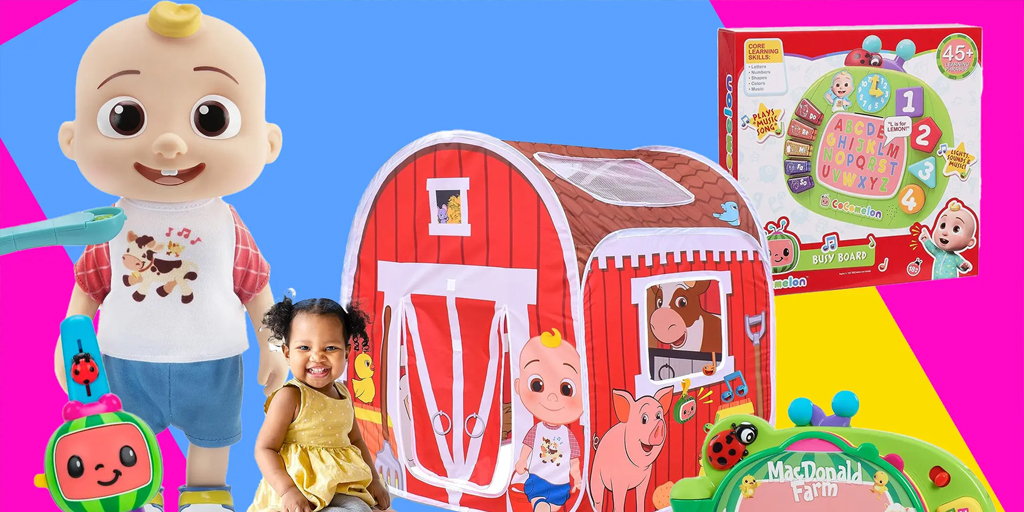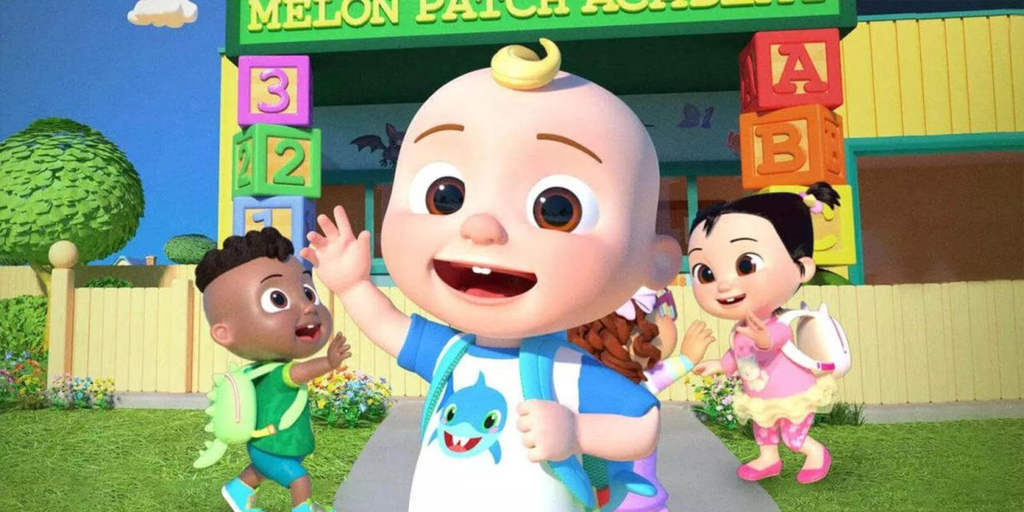Cocomelon toys are now key in early childhood play. They stem from the popular YouTube and Netflix series loved by preschoolers. The show has educational songs and bright animations. As Cocomelon rose, toys rushed to catch up. Kids can now play with their favorite characters. The toy range is vast. It includes plush dolls, musical instruments, learning tablets, playsets, and puzzles. These toys boost creativity, cognitive growth, and emotional development. They also encourage imaginative play and reinforce show lessons. Parents value them for their educational benefits. They help develop problem-solving, fine motor skills, and social interaction. These toys align with early learning curriculums, making them ideal for early development. Thus, families seeking a mix of fun and education love Cocomelon toys.
Types of coco melon toys

Plush Toys
Cocomelon plush toys are trendy. They bring screen characters into kids’ lives. Often, these toys feature characters like JJ and Cody. They offer comfort and spark imaginative play. Available in different sizes, some even play songs or say phrases from the show. They are more fun. They also reinforce lessons in counting, singing, and emotions. These toys also aid development. Kids learn and form connections, whether on adventures with plush JJ or seeking comfort. Hence, Cocomelon plush toys are a must-have for young fans.
Musical instruments
Cocomelon musical instruments spark creativity and a love for music in young children. These toys, including tambourines, xylophones, keyboards, and drums, echo the show’s musical theme. They are bright, feature characters like JJ, and include songs from the series. This makes them a hit with young fans. Moreover, these instruments support early development. Music, in turn, aids memory, language growth, and emotional expression. With their bright designs and educational benefits, Cocomelon musical instruments are perfect. They spark a child’s interest in music and reinforce the show’s lessons.
Educational players
Cocomelon educational players bring JJ and his friends to life. They offer interactive learning through play. Kids can recreate scenes from the show, like the Cocomelon School Bus, JJ’s House, or the Doctor Checkup Set. This boosts imagination and storytelling. Many playsets include character figures and interactive features, such as buttons for nursery rhymes, lights, or sounds. They teach basic concepts like numbers and letters. Through role-play, children develop social skills such as sharing, communication, and empathy. They act out scenarios with JJ and his friends. They reinforce preschool concepts like counting, colors, and problem-solving.
Learning tablets
Cocomelon learning tablets make early education fun and interactive. Interactive buttons add sounds, music, or words, enhancing learning. Designed to boost early development, these tablets encourage repetition and offer positive feedback. Kids can trace letters, match colors, or count with character guidance. Familiar Cocomelon songs enhance language skills and memory. Parents value these tablets for being educational, safe, and suitable for development. They combine digital play with learning. Portable and convenient, Cocomelon tablets ensure kids can learn and play anywhere.
The Rise of Cocomelon: A Digital Phenomenon
CoComelon has become a leading children’s brand globally, captivating millions. It started as a small YouTube channel in 2006. This makes it a top choice for parents seeking safe entertainment. The creators tapped into the demand for digital content for young children. They offer a vast library of songs teaching numbers, letters, and good behavior. As popularity surged on YouTube, CoComelon expanded to Netflix, attracting massive audiences. Its appeal lies in holding children’s attention. CoComelon blends bright visuals, catchy songs, and repetitive learning. Despite its success, CoComelon has faced criticism for overstimulation and screen addiction concerns. Yet, it remains a beloved choice in children’s entertainment, adored by families worldwide.
Why are there concerns
CoComelon is popular in children’s entertainment, but it raises concerns. One major issue is too much screen time. Experts say kids under two should limit screen time. Older toddlers can watch some, but only high-quality shows and in moderation. CoComelon’s bright colors and quick scene changes might keep kids watching longer. This could violate screen time guidelines. Another concern is overstimulation. CoComelon’s fast animations and catchy songs grab attention. However, some child psychologists warn this might overwhelm young brains. The constant stimuli make it hard for children to enjoy calmer activities. This might make it hard for kids to focus on reading or creative play. Plus, some parents say their kids prefer CoComelon’s exciting format to play. This raises concerns about becoming too dependent on screens. The show aims to be both fun and educational. But its effect on attention and development has sparked debate. Parents, teachers, and experts are talking about the role of such content in kids’ lives.
Is there a ban in sight
Discussions about CoComelon’s impact on kids are increasing. Banning the show is being considered, but no official move is in place yet. This includes both regulators and streaming platforms. The talks stem from concerns about screen time and child development. Educators, parents, and health experts take part. Some groups are now suggesting alternatives to CoComelon. They recommend slower, educational shows that promote interactive play. This change reflects worries about kids’ screen time and the content they consume. In stricter media countries, talks about limiting shows like CoComelon might intensify. Yet, such actions are still uncertain. Parents make better choices about screen time and content. Banning shows that isn’t the goal. As awareness grows, parents must balance fun with healthy viewing habits. This will keep CoComelon a positive part of kids’ media.
What Parents Can Do
As concerns about CoComelon grow, parents must guide their children’s media use. First, they should follow pediatric advice: no screens for kids under two and limited quality content for older toddlers. This prevents over-watching and ensures balance. Watching CoComelon together makes it more engaging. Parents can then discuss the show and reinforce its lessons. Mixing media types also helps. Parents can introduce slower shows, read, or encourage creative activities. This reduces the need for fast-paced content. Regular breaks from screens are crucial. “Screen-free” times boost imaginative play, outdoor fun, and family time. Parents can reduce risks and enjoy the educational benefits of CoComelon by getting involved and promoting balance.
Conclusion
No one is about to ban CoComelon. Yet, it raises concerns about children’s development. This highlights the need for careful media use. Moderation is key. CoComelon can teach and entertain. But parents must manage viewing time. They should limit screen time, watch with kids, and encourage offline activities. This prevents overstimulation and screen addiction. Instead of banning shows like CoComelon, the focus should be on safe viewing habits. Parents should track and balance screen time with other activities. This creates a healthy environment. CoComelon can fit into a child’s routine without harm. It should not replace other important developmental activities. Active, informed parenting is crucial. It maximizes benefits and minimizes risks from media content.
FAQ
How is CoComelon created?
Jay Jeon, a father of two in Southern California, founded CoComelon in 2005. Before, he directed TV commercials. While teaching his kids the ABCs, he teamed up with his wife, a children’s author. Together, they made videos for the nursery rhymes they sang to their sons.
How does CoComelon make videos?
CoComelon stands out with song duos, repetition, friendly animation, and familiar characters. It encourages unique content. The songs feature parts for both parents and kids. This setup allows them to sing and learn together.
Why isn’t CoComelon good?
Early TV shows impact kids’ emotional control and self-regulation. For instance, studies find that children watching CoComelon before age 2 struggle with executive functions by age 9.
What is the reason behind CoComelon?
Cocomelon is based on a true story. In 1995, a baby named Coco ate watermelon and got sick. After a month, doctors found he was allergic to watermelon. Sadly, he died. The show was named in his memory.
Why don’t parents like CoComelon?
There is much talk about CoComelon’s fast pace. Some parents worry it may overstimulate their child.


